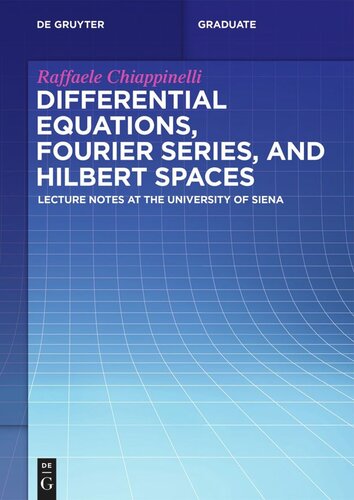

Most ebook files are in PDF format, so you can easily read them using various software such as Foxit Reader or directly on the Google Chrome browser.
Some ebook files are released by publishers in other formats such as .awz, .mobi, .epub, .fb2, etc. You may need to install specific software to read these formats on mobile/PC, such as Calibre.
Please read the tutorial at this link: https://ebookbell.com/faq
We offer FREE conversion to the popular formats you request; however, this may take some time. Therefore, right after payment, please email us, and we will try to provide the service as quickly as possible.
For some exceptional file formats or broken links (if any), please refrain from opening any disputes. Instead, email us first, and we will try to assist within a maximum of 6 hours.
EbookBell Team

4.7
86 reviewsThis book is intended to be used as a rather informal, and surely not complete, textbook on the subjects indicated in the title. It collects my Lecture Notes held during three academic years at the University of Siena for a one semester course on "Basic Mathematical Physics", and is organized as a short presentation of few important points on the arguments indicated in the title.
It aims at completing the students' basic knowledge on Ordinary Differential Equations (ODE) - dealing in particular with those of higher order - and at providing an elementary presentation of the Partial Differential Equations (PDE) of Mathematical Physics, by means of the classical methods of separation of variables and Fourier series. For a reasonable and consistent discussion of the latter argument, some elementary results on Hilbert spaces and series expansion in othonormal vectors are treated with some detail in Chapter 2.
Prerequisites for a satisfactory reading of the present Notes are not only a course of Calculus for functions of one or several variables, but also a course in Mathematical Analysis where - among others - some basic knowledge of the topology of normed spaces is supposed to be included. For the reader's convenience some notions in this context are explicitly recalled here and there, and in particular as an Appendix in Section 1.4. An excellent reference for this general background material is W. Rudin's classic Principles of Mathematical Analysis. On the other hand, a complete discussion of the results on ODE and PDE that are here just sketched are to be found in other books, specifically and more deeply devoted to these subjects, some of which are listed in the Bibliography.
In conclusion and in brief, my hope is that the present Notes can serve as a second quick reading on the theme of ODE, and as a first introductory reading on Fourier series, Hilbert spaces, and PDE